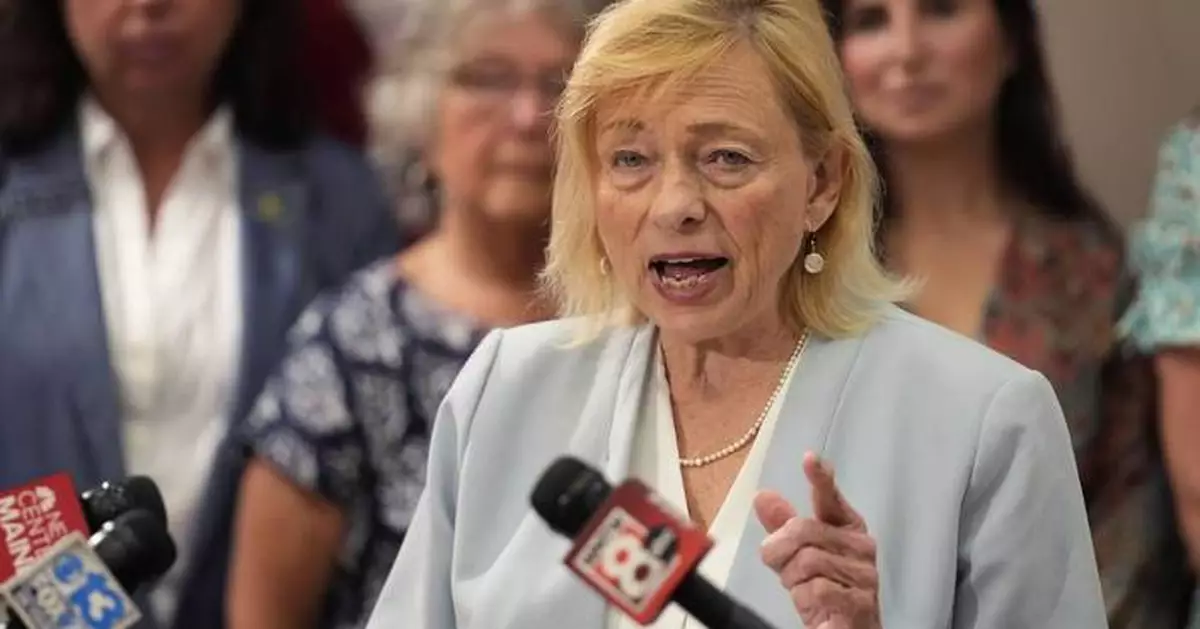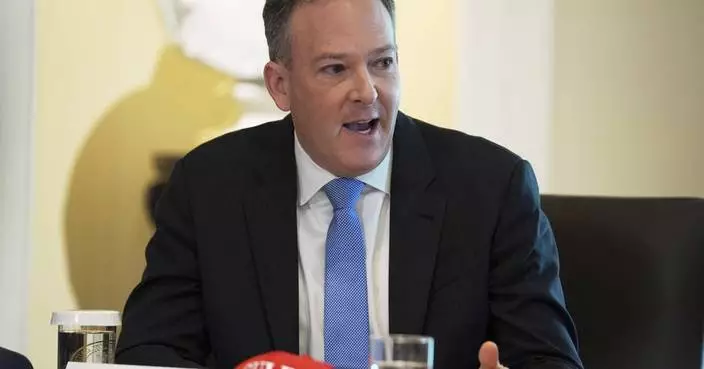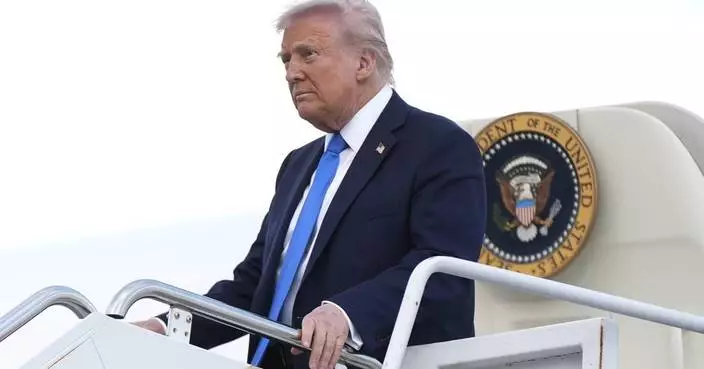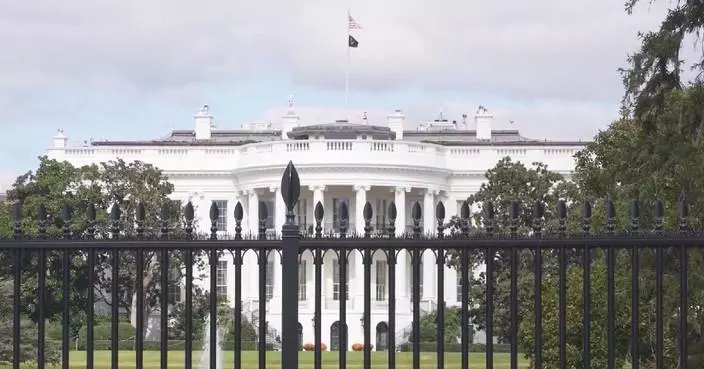PORTLAND, Maine (AP) — Maine officials said Friday the state will not comply with a ban on transgender athletes in high school sports in the wake of a Trump administration finding that the state violated antidiscrimination laws by allowing the students to participate.
The U.S. Education Department said in March that an investigation concluded the Maine Department of Education violated the federal Title IX law by allowing transgender girls to participate on girls’ teams. The investigation followed a public disagreement between Democratic Maine Gov. Janet Mills and President Donald Trump at a February meeting of governors.
Click to Gallery
FILE -State Rep. Laurel Libby, R-Auburn, speaks with a colleague, Feb. 14, 2023, at the State House in Augusta, Maine. (AP Photo/Robert F. Bukaty, file)
FILE-The morning fog lifts beyond the Burton M. Cross Building, left, and the State House, in this June 21, 2023, file photo, in Augusta, Maine. (AP Photo/Robert F. Bukaty, File)
Greely High School, which was thrust into national spotlight after a state legislator posted about a transgender student-athlete, is seen Tuesday, April 8, 2025, in Cumberland, Maine.(AP Photo/Robert F. Bukaty)
FILE-State Rep. Laurel Libby, R-Auburn, speaks in the House Chamber, in this Jan. 4, 2023, file photo, at the State House in Augusta, Maine. (AP Photo/Robert F. Bukaty, file)
FILE-Maine Gov. Janet Mills speaks to the media in this July 19, 2023, file photo, at the State House in Augusta, Maine. (AP Photo/Robert F. Bukaty, file)
The U.S. Education Department’s Office for Civil Rights issued a final warning on March 31 telling the state it needed to comply with the law in 10 business days or face enforcement from the U.S. Justice Department. That deadline arrived Friday, and the Education Department said it referred its investigation to the Justice Department for further enforcement.
Maine and the federal government are at impasse, as the state will not sign a resolution proposed by the Trump administration to resolve the disagreement by banning the transgender athletes, said Maine assistant attorney general Sarah Forster in a letter to the Education Department.
“Nothing in Title IX or its implementing regulations prohibits schools from allowing transgender girls and women to participate on girls’ and women’s sports teams,” Forster's letter stated. “Your letters to date do not cite a single case that so holds.”
Trump has said the state risks losing federal funding if it does not come into compliance. Friday, the Education Department said it was also taking steps toward the termination of Maine's education funding.
“The Department has given Maine every opportunity to come into compliance with Title IX, but the state’s leaders have stubbornly refused to do so, choosing instead to prioritize an extremist ideological agenda over their students’ safety, privacy, and dignity,” said Craig Trainor, acting assistant secretary for the Education Department’s Office for Civil Rights. “The Maine Department of Education will now have to defend its discriminatory practices before a Department administrative law judge and in a federal court against the Justice Department.”
Federal funding is critical to Maine schools. Maine got $358 million in federal funding for K-12 schools in 2021-22, or 10% of its budget, according to data from the Census. About 13% of that money went to Title I, 14% to special education and 20% to child nutrition programs such as school lunches. Title I provides supplemental financial assistance to school districts for children from low-income families.
Almost half of federal funds were simply marked as “other,” which likely points to the substantial COVID-19 relief funds schools got that year. Prior to the pandemic, Maine got 6% of its funding from federal sources, almost $185 million in 2018-19.
The issue of school funding and transgender participation in sports in Maine began to bubble up when Mills and Trump sparred over the subject during the February meeting at the White House. During the meeting, Trump threatened to pull federal funding from Maine if the state did not comply with his executive order barring transgender athletes from sports.
Mills responded: “We’ll see you in court.”
Soon after, the Education Department and the U.S. Department of Health and Human Services launched investigations into the state.
Health and Human Services officials said in March that the Maine Department of Education, Maine Principals’ Association and a high school are each in violation of Title IX because of the participation of transgender athletes. The Health Department has already referred the issue to the Justice Department for enforcement in court.
The principals’ association and school district both said they would not comply with a proposed agreement to ban the athletes.
Maine Republicans, who are in the minority in both houses of the Legislature, have put pressure on state Democrats to resolve the investigations. House Republican Leader Billy Bob Faulkingham, speaking during a news conference, said Mills has created a “hostage situation” that jeopardizes federal funding.
“The governor, and her administration, is holding Maine schools and Maine education under hostage,” Faulkingham said. “This standoff is not going to end well for the state of Maine and its education funding.”
LGBTQ+ rights groups in Maine have defended the state’s approach. “We’re not giving in, and we’re not giving up on our trans community,” EqualityMaine said in a social media post.
Federal authorities have also said they are investigating Maine due to claims school districts in the state violate federal law by withholding information about students’ gender transitioning from parents.
Associated Press writer Sharon Lurye in New Orleans contributed to this report.
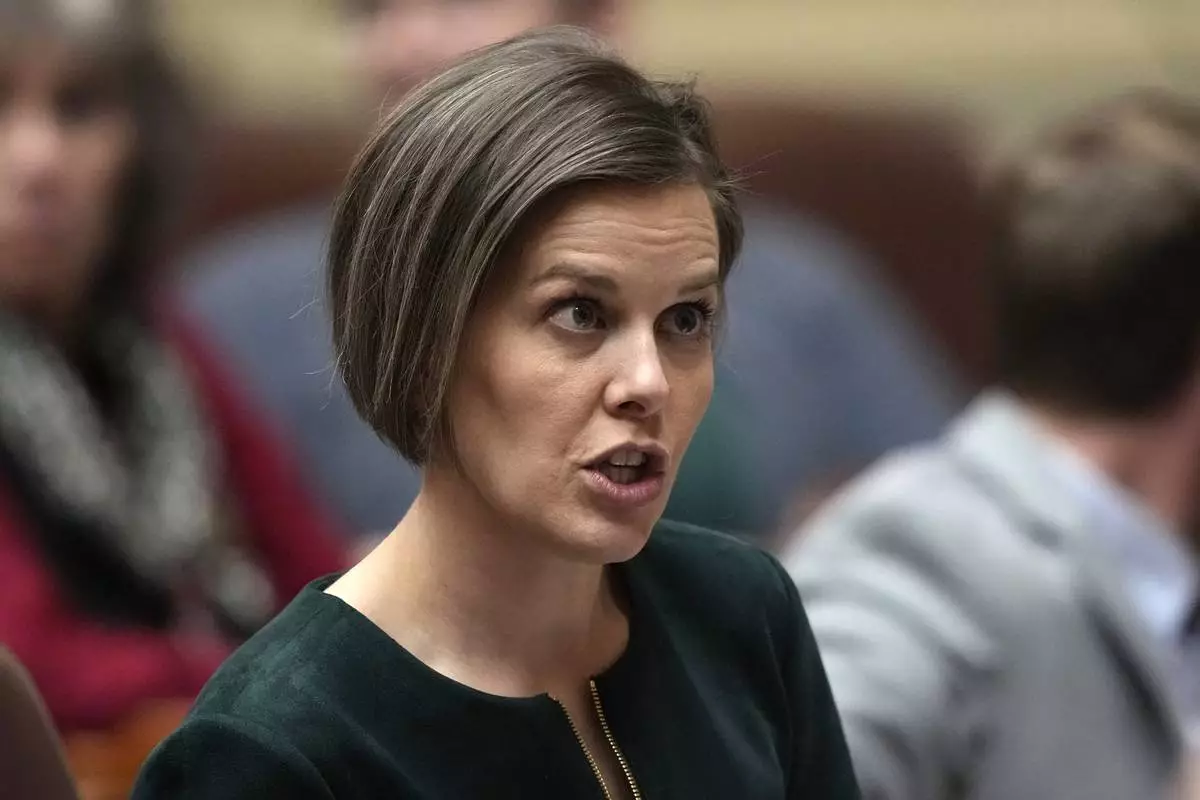
FILE -State Rep. Laurel Libby, R-Auburn, speaks with a colleague, Feb. 14, 2023, at the State House in Augusta, Maine. (AP Photo/Robert F. Bukaty, file)

FILE-The morning fog lifts beyond the Burton M. Cross Building, left, and the State House, in this June 21, 2023, file photo, in Augusta, Maine. (AP Photo/Robert F. Bukaty, File)
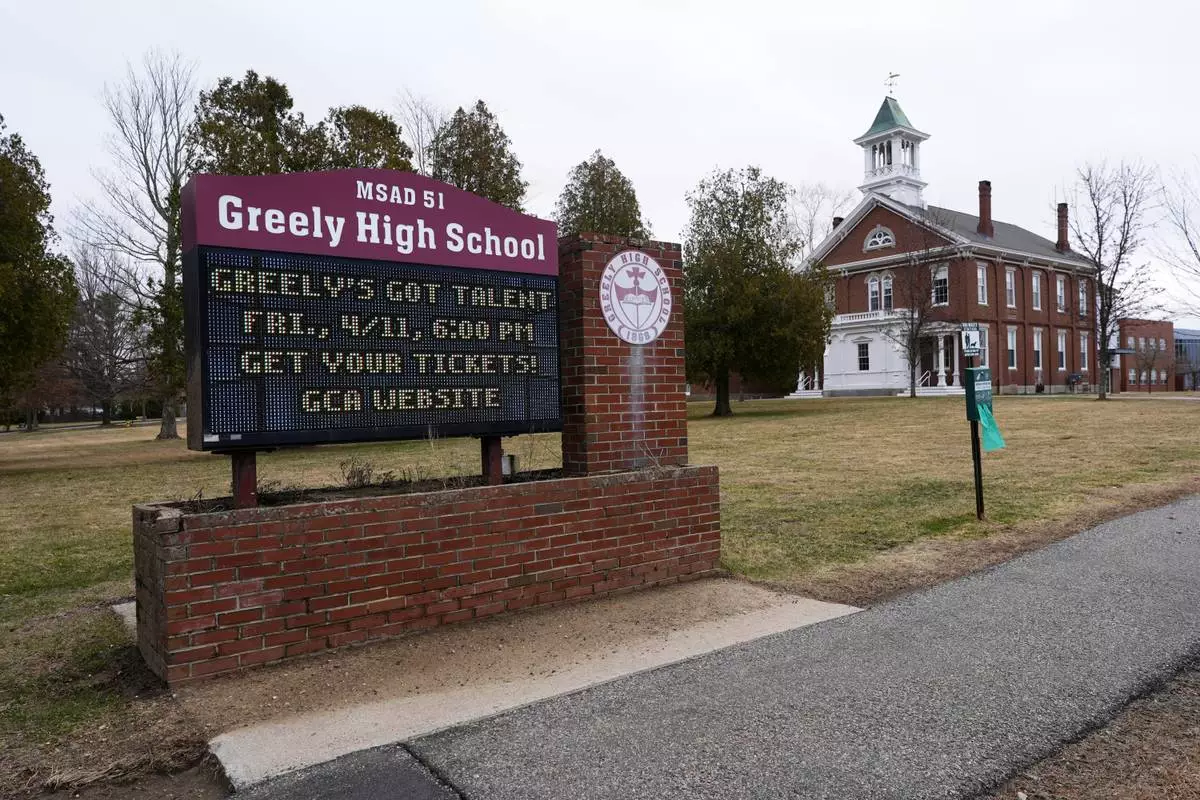
Greely High School, which was thrust into national spotlight after a state legislator posted about a transgender student-athlete, is seen Tuesday, April 8, 2025, in Cumberland, Maine.(AP Photo/Robert F. Bukaty)
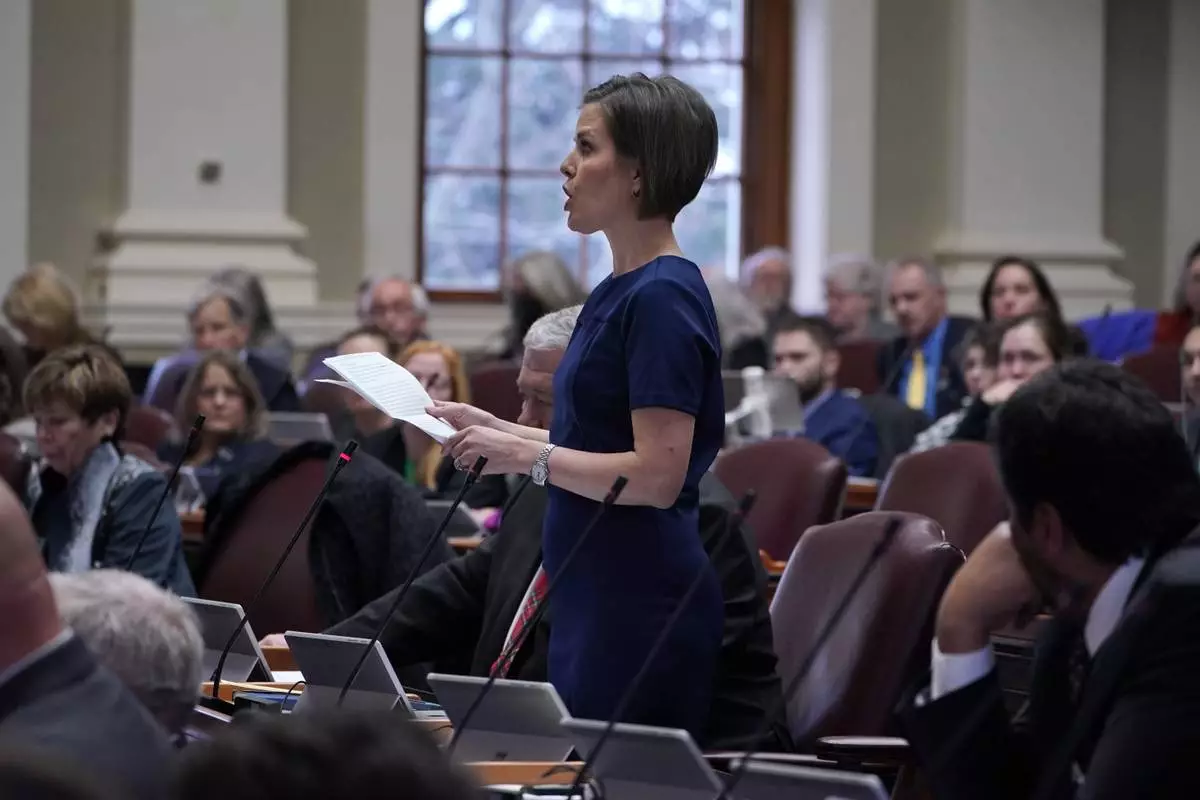
FILE-State Rep. Laurel Libby, R-Auburn, speaks in the House Chamber, in this Jan. 4, 2023, file photo, at the State House in Augusta, Maine. (AP Photo/Robert F. Bukaty, file)
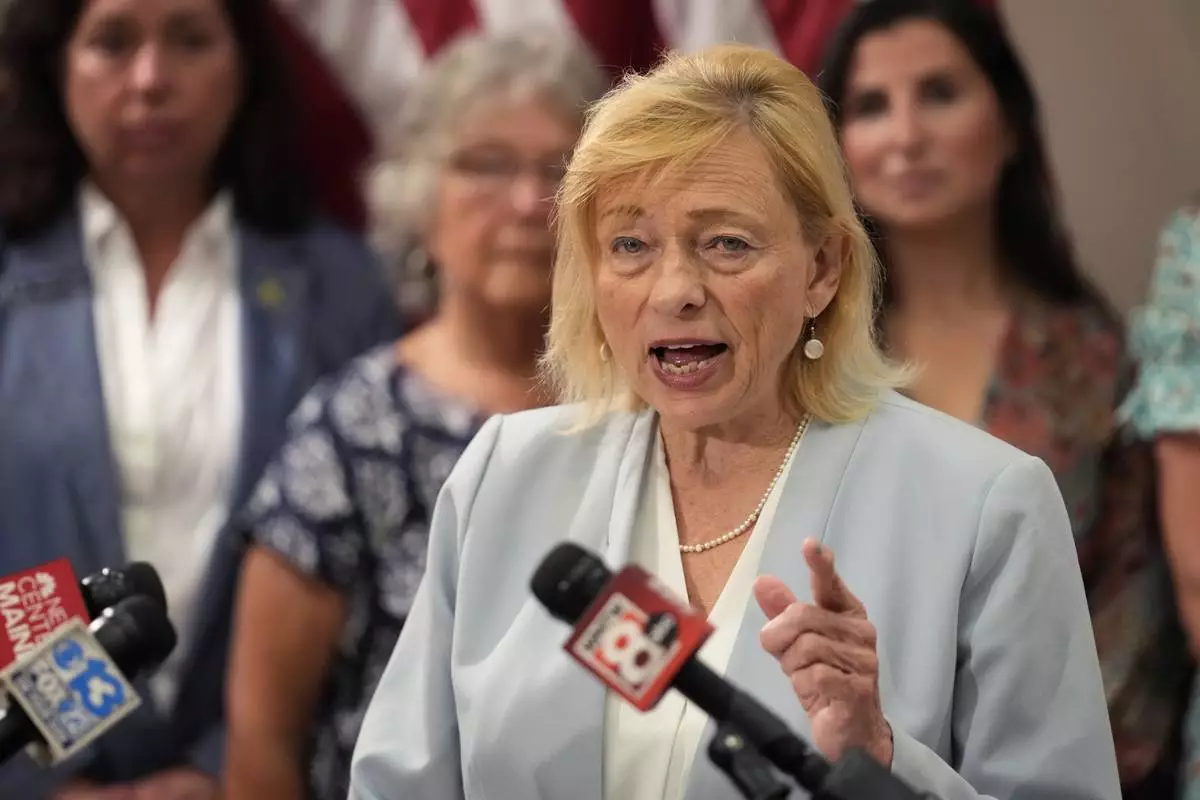
FILE-Maine Gov. Janet Mills speaks to the media in this July 19, 2023, file photo, at the State House in Augusta, Maine. (AP Photo/Robert F. Bukaty, file)
WASHINGTON (AP) — The White House released President Donald Trump's 2026 budget proposal Friday, hoping to slash, if not zero out, spending on many government programs. It seeks a sweeping restructuring of the nation’s domestic priorities, reflective of the president’s first 100 days in office and sudden firing of federal workers.
Trump's plan aims for steep cuts to child care, disease research, renewable energy and peacekeeping abroad, many already underway through Elon Musk’s Department of Government Efficiency, all while pumping up billions for the administration's mass deportation agenda.
The budget drafters echo Trump’s promises to end “woke programs,” including preschool grants to states with diversity programs. And they reflect his vow to stop the “weaponization of government” by slashing the Internal Revenue Service, even as critics accuse him of using the levers of power to punish people and institutions he disfavors
Overall, it’s a sizable reduction in domestic accounts — some $163 billion, or 22.6% below current year spending, the White House said.
At the same time, the White House said it is relying on Congress to unleash $375 billion in new money for for the Homeland Security and Defense departments as part of Trump’s “big, beautiful bill” of tax cuts and spending reductions. His goal is to repel when he calls a “foreign invasion," though migrant arrivals to the U.S. are at all-time lows.
House Speaker Mike Johnson welcomed the proposal as “a bold blueprint that reflects the values of hardworking Americans and the commitment to American strength and prosperity.”
Budgets do not become law, but serve as a touchstone for the coming fiscal year debates. Often considered a statement of values, this first budget since Trump's return to the White House carries the added weight of defining the Republican president's second-term pursuits, alongside his party in Congress.
It comes as Trump has unilaterally imposed what could be hundreds of billions of dollars in tax increases in the form of tariffs, setting off a trade war that has consumers, CEOs and foreign leaders worried about a possible economic downturn.
Democrats assailed the budget as a devastating foreshadowing of Trump's vision for the country.
“President Trump has made his priorities clear as day: he wants to outright defund programs that help working Americans," said Sen. Patty Murray of Washington, the top Democrat on the Appropriations Committee. This, she said, “while he shovels massive tax breaks at billionaires like himself and raises taxes on middle-class Americans with his reckless tariffs.”
The White House Office of Management and Budget, headed by Russell Vought, a chief architect of Project 2025 from the conservative Heritage Foundation, provided contours of a so-called skinny version of topline numbers only.
It covers only the federal government's discretionary spending, now about $1.83 trillion a year on defense and nondefense accounts. Trump's team drops that spending by $163 billion, to $1.69 trillion, a portion of the nation's nearly $7 trillion budget that includes far more programs and services.
Federal budgets have been climbing steadily, as have annual deficits that are fast approaching $2 trillion with annual interest payments on the debt almost $1 trillion. That’s thanks mostly to the spike in emergency COVID-19 pandemic spending, changes in the tax code that reduced revenues and the climbing costs of Medicare, Medicaid and other programs, largely to cover health needs as people age. The nation’s debt load, at $36 trillion, is ballooning.
“We need a budget that tells the full story, and it should control spending, reduce borrowing, bring deficits down,” said Maya MacGuineas, president of the Committee for a Responsible Federal Budget, a fiscal watchdog group.
Among some of the White House's proposed highlights:
The State Department and international programs would lose 84% of their money and receive $9.6 billion, reflecting deep cuts already underway, including to the U.S. Agency for International Development.
The Health and Human Services Department would be cut by $33.3 billion and the Education Department’s spending would be reduced by $12 billion. The Centers for Disease Control and Prevention and the National Institutes of Health would all face steep reductions.
The Defense Department would get an additional $113.3 billion and Homeland Security would receive $42.3 billion more. Much of that is contingent on Congress approving Trump's big bill. That approach drew criticism from leading defense hawks, among them the former GOP Leader, Sen. Mitch McConnell of Kentucky.
McConnell called the proposed boost in defense money in the president's budget a “gimmick."
“America cannot expect our allies to heed calls for greater annual defense spending if we are unwilling to lead by example," McConnell said in a blistering statement. "Fortunately, Presidential budget requests are just that: requests. Congress will soon have an opportunity to ensure that American power – and the credibility of our commitments – are appropriately resourced."
It's Congress, under its constitutional powers, that decides the spending plans, approves the bills that authorize federal programs and funds them through the appropriations process. Often, that system breaks down, forcing lawmakers to pass stopgap spending bills to keep the government funded and avoid federal shutdowns.
Congress is already deep into the slog of drafting of Trump’s big bill of tax breaks, spending cuts and bolstered funds for the administration’s mass deportation effort — a package that, unlike the budget plan, would carry the force of law.
Vought is also expected on Capitol Hill in the weeks ahead as the Trump administration presses its case.
Among the more skilled conservative budget hands in Washington, Vought has charted a career toward this moment. He served during the first Trump administration in the same role and, for Project 2025, wrote an extensive chapter about the remaking of the federal government.
Vought has separately been preparing a $9 billion package that would gut current 2025 funding for the U.S. Agency for International Development and the Corporation for Public Broadcasting, which involves the Public Broadcasting Service and National Public Radio. Trump signed an executive order late Thursday that instructs the Corporation for Public Broadcasting and federal agencies to cease funding for PBS and NPR.
Vought has said that a package of so-called budget rescissions would be a first of potentially more, as the Trump administration tests the appetite in Congress for lawmakers to go on record and vote to roll back the money.
This story has been corrected to reflect that the administration is proposing to cut the Health and Human Services budget by $33.3 billion, not $33.3 trillion.
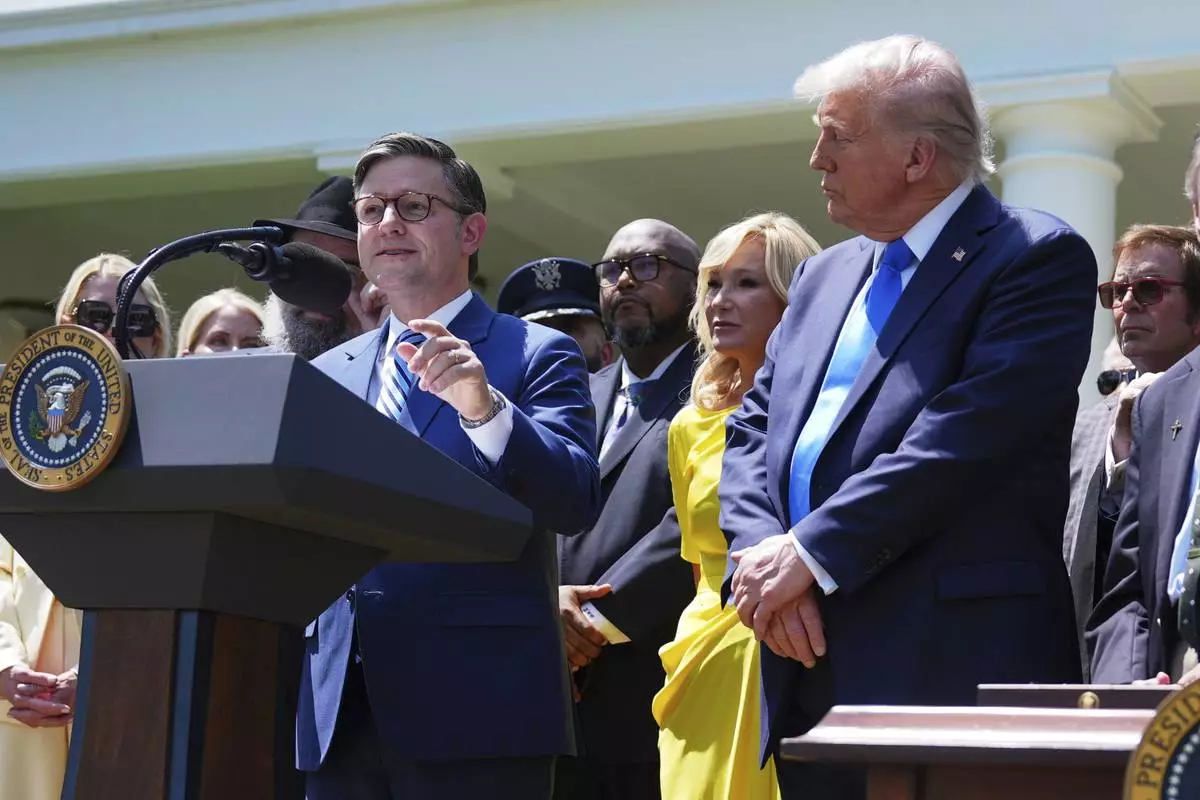
House Speaker Mike Johnson, R-La., speaks as President Donald Trump, right, listens during a National Day of Prayer event in the Rose Garden of the White House, Thursday, May 1, 2025, in Washington. (AP Photo/Evan Vucci)
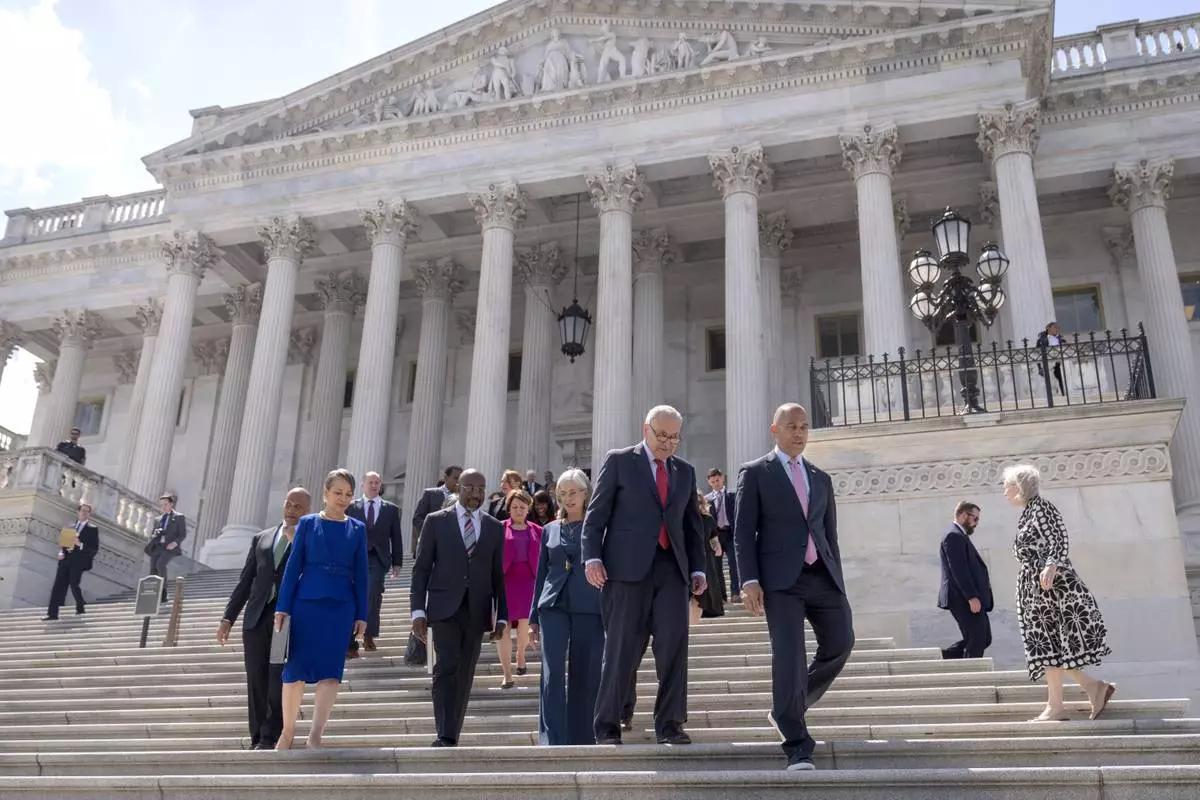
Senate Minority Leader Chuck Schumer, of N.Y., second from right, and House Minority Leader Hakeem Jeffries, of N.Y., right, arrive with other House and Senate Democrats for an event to mark 100 days of President Donald Trump's term on the steps of the Senate on Capitol Hill, Wednesday, April 30, 2025, in Washington. (AP Photo/Mark Schiefelbein)
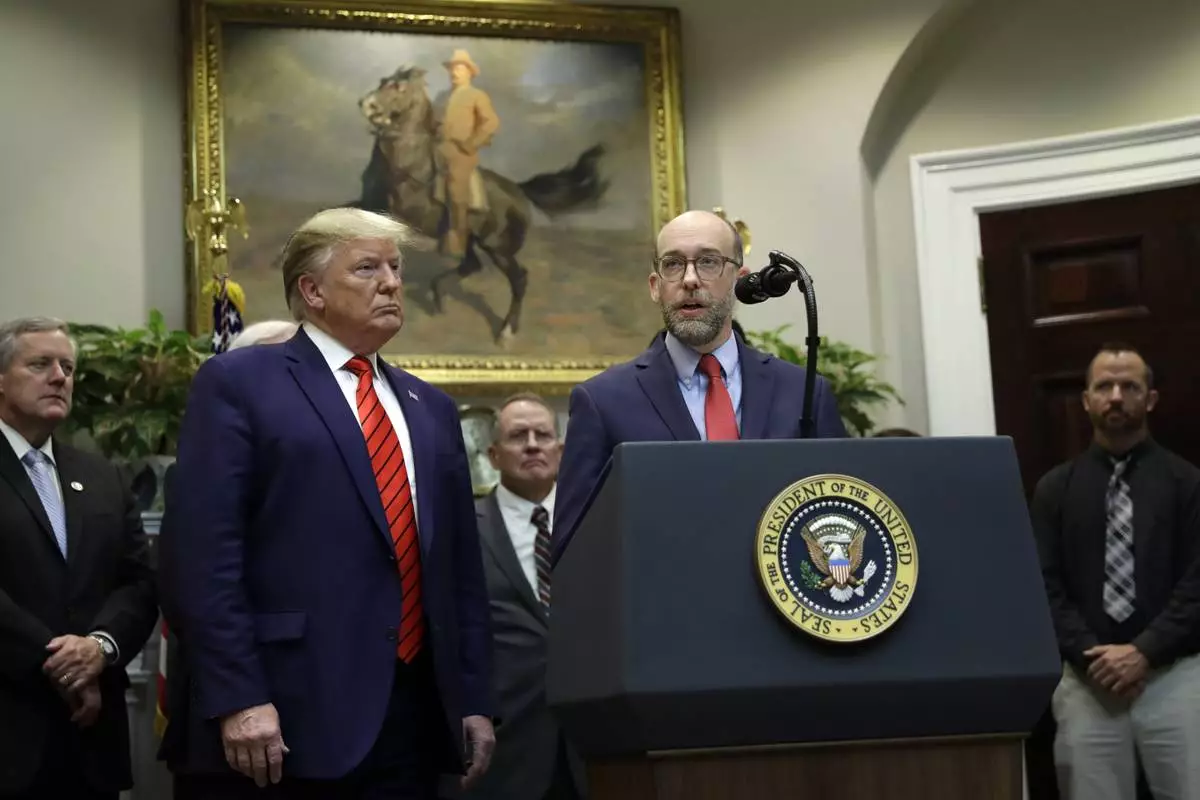
FILE - President Donald Trump listens as acting director of the Office of Management and Budget Russ Vought speaks during an event on "transparency in Federal guidance and enforcement" in the Roosevelt Room of the White House, Oct. 9, 2019, in Washington. (AP Photo/Evan Vucci, File)







